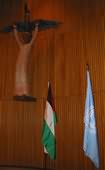UN Day of Solidarity with the Palestinian People, November 29, 2007
The UN Marks 60 Years After the 1947 General Assembly
Partition Resolution By Flying Only the Flag of "Palestine"
 |  |
In 2005 the same event sported a Middle East map without the state of Israel and included a moment of silence honoring the self-sacrifice of suicide bombers.
In 2006 (after EYEontheUN had exposed the scandal) the map did not appear and the moment of silence was omitted. Instead, in 2006 the UN Trusteeship Council room was adorned with a series of panels rewriting the history of the Arab-Israeli conflict from the Arab point of view, describing 7 or 8 million Palestinians claiming a right to return - enough to destroy the Jewishness of the state of Israel, and lauding the success of the violent Palestinian uprising or intifada.
In 2007 (after EYEontheUN had detailed that event) the panels did not appear. Instead, the occasion was marked by what a Secretariat official casually described as "just keeping it clean" - flying only the flags of "Palestine" and the UN.
Lest the simple message of the organizers who refused to fly the Israeli flag be missed, statements of some meeting participants were more explicit. They glorified violence, complained of the evils of "Judaization", pressed the message of a racist Jewish state, and called for Israel's economic strangulation.
said: "It was 20 years ago that the Palestinians as a people stood up to the occupation, and the world learned a new word -- intifada."
Palestinian President Mahmoud Abbas delivered a statement through Yasser Abed Rabbo (also Abedrabou), Secretary-General of the Executive Committee of the PLO. This alleged peace partner accused Israel of "the construction of the apartheid Wall" at the same time as he objected to "judaization measures." Lost on the PLO representative was the contradiction between alleging Israel practices apartheid on the one hand, and objecting to Jews living in "Arab territory" on the other. (He took no notice of the fact that one-fifth of the population of Israel is Arab with more democratic rights than in any Arab state, while Arab states were made Judenrein after the creation of Israel.) The logo of the letterhead upon which his statement was officially circulated has a map claiming all of Israel is "Palestine".
 |
| This is the letterhead upon which the statement of Abbas was distributed |
The representative of "civil society" invited by the UN Committee to address the audience was Rev. Chris Ferguson of the World Council of Churches. He could only bring himself to refer to terrorism in quotation marks – ""terrorizing" Qassam rocket attacks." He was given a UN platform – webcast around the world – to call upon the international community to "strengthen the global campaign for boycotts, divestment and sanctions...against Israeli...apartheid and oppression," and to laud the latest NGO "campaign identifying and opposing Israeli policies as violations of the International Covenant Against the Crime of Apartheid."
In the afternoon of November 29, the General Assembly dedicated yet another session to condemning Israel. PLO representative Abed Rabbo – fresh from the PLO's Annapolis declaration of peaceful intentions – demanded "the right of more than 4 million Palestine refugees to return to their homes and properties" (thus destroying a Jewish state). He also made a point of analogizing Israeli actions to those of Hitler and apartheid South Africa, making wild accusations about Palestinian "ghettos" and "Bantustans."
Following the General Assembly meeting, Abed Rabbo, and Paul Badji opened a public exhibit at UN headquarters. The exhibit was billed as celebrating "traditional Palestinian costumes and embroidery" and consists of a series of costumes previously exhibited in various parts of the United States - with one exception. Set in the middle, evidently more attuned to a Palestinian cultural exhibit presented "under the auspices of the Committee on the Inalienable Rights of the Palestinian People, in cooperation with the Permanent Observer Mission of Palestine to the United Nations" comes this:
 |  | |
| This is a depiction of Israel's security barrier which has dramatically reduced Palestinian suicide bombings and terrorist attacks since it was erected... | ...with this description to the right. |
Evidently the ugliness of Jewish children blown apart by suicide bombers (who deliberately target venues which children frequent) was of less significance then the aesthetics of a barrier keeping would-be-killers out.
Next week the General Assembly will adopt another four resolutions condemning Israel which originate with Mr. Badji's UN Committee.

